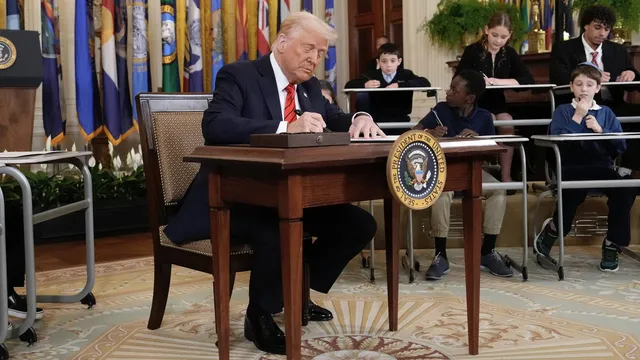
Trump pardons Thomas Caldwell, a convicted Capitol rioter
2025-04-03 07:00- Thomas Caldwell was convicted of obstructing Congress in relation to the Capitol riot in January 2021.
- His sentence was commuted before Trump issued a full pardon on March 20, 2025.
- The pardoning of Caldwell is part of a broader trend regarding Trump's treatment of those involved in the Capitol events.
Express your sentiment!
Insights
In the United States, on March 20, 2025, President Donald Trump issued a pardon to Thomas Caldwell, a Virginia man formerly convicted for his involvement in the January 6, 2021, riot at the U.S. Capitol. Caldwell, a retired Navy intelligence officer, was previously tried alongside Stewart Rhodes, the founder of the Oath Keepers group. The trial resulted in Caldwell being acquitted of the most serious charge of seditious conspiracy but found guilty of other felony counts, including obstructing Congress. The charges stemmed from the events during the Capitol riot, where Caldwell was accused of coordinating actions related to the extremist group he was associated with. Caldwell’s conviction was impacted by a Supreme Court ruling that limited the application of the federal obstruction law used against January 6 defendants. A jury had sentenced Caldwell to time served after spending over 50 days in jail before the pardon was granted. Trump’s pardon also came as part of a broader clemency initiative that he rolled out shortly after taking office for a second term. This initiative was directed towards many individuals charged in connection with the Capitol insurrection, reflecting Trump’s approach toward his supporters and the legal ramifications they faced post-riot. Caldwell’s defense attorney expressed that Caldwell was ecstatic about the pardon, suggesting that it rectified what they perceived to be an unjust prosecution. Observers have noted the political implications of such pardons, as they underscore the divide in perspectives regarding the January 6 events and why some defendants are viewed as political prisoners by certain groups. The fate of these pardons and the related controversies reflect ongoing debates about accountability and justice in the wake of the Capitol riot. As significant figures within these extremist groups, the individuals granted clemency often argue for the restoration of their rights, including military benefits or voting rights affected by their convictions. The ramifications of such pardons continue to reverberate, not just for the pardoned individuals but also for the political landscape, raising questions about the future of similar cases and the nature of justice in America today.
Contexts
The impact of pardons on January 6 defendants has garnered significant attention in recent years, particularly due to the unprecedented nature of the events surrounding January 6, 2021. The Capitol riot, which aimed to overturn the results of the 2020 Presidential Election, resulted in numerous arrests and charges against individuals involved in the insurrection. In light of the continuing political and social discourse surrounding these events, the role of pardons has emerged as a critical area of analysis. Pardons, particularly those that may be issued by a President or a state governor, can have profound implications for the defendants, potentially altering the course of their legal battles as well as affecting public perception and future legislative measures regarding political violence and civil disobedience. The discussion around pardons centers on their capacity to mitigate legal consequences for January 6 defendants who faced various charges, including insurrection, assault, and trespassing. Legal observers note that clemency initiatives could serve as a signal to sympathizers, potentially normalizing or legitimizing the actions of the rioters in the eyes of certain political factions. The prospect of pardons may also influence the defendants' decisions regarding plea deals and cooperation with ongoing investigations, as well as their public narratives as individuals entangled in the legal system. Consequently, the examination of pardons in this context requires an understanding of their broader implications on the rule of law and social order in the United States. Moreover, the timing and political context surrounding any pardons could shape public opinion significantly. If pardons are perceived as politically motivated or as encouraging anti-democratic actions, they may lead to greater division within the American electorate. The subsequent reactions can serve as a barometer of the nation's sentiment toward accountability and justice. Political leaders' stances on these issues may further inform public discourse, shaping narratives around law enforcement and the treatment of protestors, radical activists, and supporters of insurrection. Thus, the decision-making process regarding pardons not only affects the legal outcomes for January 6 defendants but may also reverberate through various aspects of American society, enhancing polarizations and complicating the political landscape. Lastly, the potential for future pardons raises vital questions about the precedent they set for handling political dissent and civil unrest. As more individuals become involved in political movements that challenge the status quo, the implications of clemency decisions will be critical in guiding the nation’s judicial response to these partisan conflicts. The interplay of law, justice, and political power remains a delicate balance, and the analysis of pardons related to January 6 defendants exemplifies the complexities inherent in contemporary American democracy. Evaluating the impacts of such actions fosters an essential dialogue on accountability, civil rights, and the essence of justice in an era marked by deep political divisions.